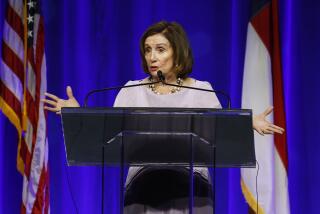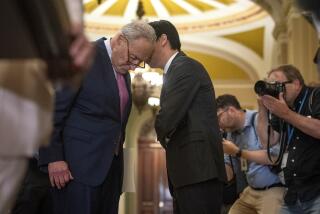Democrats open formal impeachment inquiry into President Trump

- Share via
WASHINGTON — House Speaker Nancy Pelosi said Tuesday the House would open an impeachment inquiry into President Trump, setting the stage for a monumental clash between Congress and the president a year away from the 2020 election.
With more than a dozen moderate House Democrats since Monday joining the long list of those demanding an impeachment inquiry, Pelosi (D-San Francisco) — who had long opposed taking such a formal step — ultimately responded to the mounting pressure from her caucus.
“The actions of the Trump presidency have revealed the dishonorable fact of the president’s betrayal of his oath of office, betrayal of our national security and betrayal of the integrity of our elections,” Pelosi said. “No one is above the law.”
Democrats said they would not create a special committee, such as the one during the Watergate scandal. Instead, pending investigations in six House committees will continue, and the strongest evidence will be forwarded to the Judiciary Committee, which will examine whether to write articles of impeachment.
Several Democrats said the inquiry would be expedited, but no timeline was discussed. Pelosi’s formal declaration, although a historic and grave step, will not substantially change the day-to-day progress of the investigations. The declaration will not accompany any formal vote on the House floor nor give the committees any new oversight or investigative authority. But it focuses the House’s mission for the final weeks of 2019.
“Everybody is now on board completely and it is a question of great national security, so this is not something that will drag out for months,” Rep. Pramila Jayapal (D-Wash.) said.
Pelosi’s support also adds huge political import to the impeachment effort. Democrats who were once reluctant to pursue impeachment said they were swayed by the seriousness of the allegations.
“It was bad enough he was doing it as a candidate,” House Intelligence Committee Chairman Adam B. Schiff (D-Burbank) told House Democrats in a closed-door meeting Tuesday afternoon, according to a person in the room. “But it’s a whole other thing to abuse the power of his office.” Schiff had previously opposed an impeachment inquiry.
The move came as Trump earlier in the day acknowledged for the first time that he had held up aid to Ukraine shortly before speaking in July with that country’s president, Volodymyr Zelensky. During that call, he urged the foreign leader to investigate former Vice President Joe Biden, a possible Trump opponent in the 2020 presidential race.
Those actions reportedly triggered an unidentified whistleblower in the intelligence community to write a complaint about the president. The Office of the Director of National Intelligence has refused to share the complaint with Congress, triggering a battle with Democratic lawmakers.
Schiff (D-Burbank) said Tuesday that the whistleblower had expressed interest in speaking with the House Intelligence Committee, perhaps as soon as this week.
On Tuesday afternoon, Trump announced he had ordered the release on Wednesday of the “complete fully declassified and unredacted transcript” of the July phone conversation. An administration official said the whistleblower complaint is also going through the declassification process and could be provided to Congress as early as this week, although the exact timing is unclear.
Trump has claimed that his actions were appropriate and that there was no link between the withholding of the aid and his request that Ukraine investigate Biden. In a flurry of tweets and statements Tuesday, Trump called the Democrats’ inquiry “just a continuation of the witch hunt.... Our country’s doing the best it’s ever done. They’re going to lose the election.”
House Minority Leader Kevin McCarthy (R-Bakersfield) dismissed the impeachment inquiry as the latest effort by Democrats to overturn the 2016 election results. “They have been investigating this president before he even got elected,” he said.
Initially, Trump insisted that his comments about Biden to the Ukrainian leader were rooted in his concern about corruption and that U.S. funds were not being misused. On Tuesday, Trump shifted, saying he withheld the aid out of frustration that European nations were not contributing their fair share of aid to Ukraine.
Now Democrats will investigate whether the president withheld Ukrainian aid that Congress had approved in order to pressure Zelensky to meddle in the 2020 U.S. election. The aid was released this month, days after Congress learned of the whistleblower complaint.
During an appearance at the Atlantic Festival on Tuesday, Pelosi said the administration was illegally withholding the complaint. “The DNI is at present time breaking the law at the direction of the administration,” Pelosi said.
Though Pelosi had said she would pursue impeachment only with overwhelming evidence of wrongdoing and bipartisan support, the latest allegations and support from her caucus changed her position. Democrats long insisted that Pelosi wouldn’t pursue impeachment unless her members supported it.
“This is definitely a turning point for the caucus and for the speaker,” said Danny Weiss, Pelosi’s former chief of staff.
The impeachment support dramatically swelled between Monday and Tuesday as the whistleblower story unfolded. Seven freshmen House Democrats with national security backgrounds warned in a Washington Post op-ed posted late Monday that Trump’s actions would be impeachable offenses. It was not a call for impeachment, but the identities of authors — many from Trump districts — set off a cascade.
Since then, at least a dozen other Democrats who had been holdouts against impeachment — including Reps. Lizzie Fletcher of Texas and Antonio Delgado of New York — reversed course and came out with their support for an inquiry. Together, they represent some of the most Trump-leaning districts in the country, suggesting they do not believe there will be a political price to pay for beginning an impeachment inquiry.
A key concern of some Democrats has been that impeachment of Trump would backfire, by ginning up Trump’s base or alienating independent voters. It could also put moderate Democrats in Trump-leaning districts in a difficult position in 2020.
But several lawmakers who are close allies of the speaker, including Reps. Rosa DeLauro (D-Conn.) and Debbie Dingell (D-Mich.), indicated that they too supported the call.
“The time to begin impeachment proceedings against this president has come,” said Rep. John Lewis (D-Ga.), the civil rights leader whose opinion weighs heavily with Democrats and who is often aligned with Pelosi.
At Tuesday’s meeting, Pelosi provided few details of what the next steps would look like. Democrats coalesced their support for an inquiry and no lawmaker voiced opposition to the path ahead, according to people in the room.
But skeptics remain. Rep. Kurt Schrader (D-Ore.) left the meeting unsure whether he supported the inquiry. “I’m trying to figure that out,” he said.
Some expressed a sense of relief that the months-long internal debate over whether to open a formal inquiry is behind them.
Ross Garber, a Tulane University law professor who is an expert on impeachment, said it was still unclear how significant Pelosi’s announcement will be. Would House Democrats, for example, hire additional staff to conduct investigations and how will they coordinate their work? he asked. “The speaker’s words are meaningful, but it’s the actions, or lack of actions, that will be the real story, “ Garber said.
Rep. Richard E. Neal (D-Mass.), chairman of the House Ways and Means Committee who is leading a House investigation into Trump’s taxes, told reporters the inquiry would take the form of an “umbrella” under which the chairs of the six committees will proceed with independent investigations. “It increases the level of responsibility, so I think we’re approaching this in a unified way,” he said.
The political dynamic that has worried House Democrats since the beginning of the year has not changed. Even if the House is able to impeach the president, the Republican-controlled Senate is almost certainly not going to convict him. Trump would remain in office and have a Senate acquittal to run on.
No Senate Republican has publicly suggested seeing the Ukraine events as impeachable, although Sens. Mitt Romney of Utah and Susan Collins of Maine have gone the furthest of any Senate Republican, demanding that the whistleblower complaint be turned over to Congress.
Rep. Jim Jordan (R-Ohio) said the inquiry is a sign of Democrats’ desperation. “Speaker Pelosi’s decision to pursue impeachment now — on the basis of unsubstantiated, indirect and anonymous allegations — only shows that the speaker has finally succumbed to unrelenting pressure from the socialist wing of the Democrat Party.”
Times staff writers Noah Bierman and Chris Megerian contributed to this report.
More to Read
Get the L.A. Times Politics newsletter
Deeply reported insights into legislation, politics and policy from Sacramento, Washington and beyond. In your inbox twice per week.
You may occasionally receive promotional content from the Los Angeles Times.













